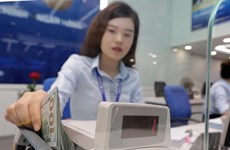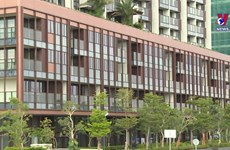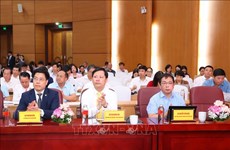Real estate, securities investors pour money into agriculture
Agriculture, which has been described as unprofitable and risky for
investors, is turning out to be attractive in the eyes of real estate
and securities firms, who have tasted bitterness in their core business
fields, according to a report published by the English language news
website VietNamNet Bridge.
Agriculture, which has been described as unprofitable and risky for
investors, is turning out to be attractive in the eyes of real estate
and securities firms, who have tasted bitterness in their core business
fields, according to a report published by the English language news
website VietNamNet Bridge.
Traditionally, agriculture has had a hard time attracting major sources of capital. Farming’s susceptibility to such uncontrollable factors as weather, climate, and unstable market prices tended to scare off risk-averse investors. Those with large capital resources would rather inject their money into the real estate, finance or banking sectors, which could provide both safety and reasonable profits.
However, times have changed. Once valuable assets have become largely unsalable because people, in the context of an economic downturn, only spend money on the most essential goods, while canceling big purchase plans.
And some savvy investors, sensing which way the new wind is blowing, have driven their cash flow into agriculture, the sector that, for the most part, is all about the necessities of life.
Le Chi Hieu, President and CEO of Thu Duc House, said his company has a “new job” – exporting farm and forestry produce.
Under a cooperation contract between the Thu Duc Farm Produce Market Management Company, a subsidiary of Thu Duc House, and a maize farm in Binh Thuan province, the farm is in charge of employing high technology to grow maize, while the company handles export of the products.
Thu Duc has also been pushing the export of woodchips, materials that serve the paper industry, and cassava for making alcohol to Japanese companies.
Hoang Anh Gia Lai Group, previously known as a major player in the real estate sector, has been focusing on developing agriculture projects for the last several years. The leader of the group has recently announced that agriculture production is one of the two main business fields of the group.
Hoang Anh Gia Lai began growing rubber in 2007, with the first harvest arriving in 2012. It has developed 35,000 hectares of rubber, sugar cane and palm oil in Laos after only one year of investing in the country.
Nguyen Van Dat, the owner of Phat Dat Real Estate Development JSC, has added forest development, rubber growing, cultivation and husbandry to the company’s business license.
Dat said that doing some other types of business is necessary to help it profit and stay alive.
An Duong Thao Dien, a trade and real estate development firm, in late 2013 announced a capital contribution to Ascentro Investment and Trade Company, which specializes in trading farm and forestry materials and live animals.
Saigon Securities Incorporated (SSI), a large securities firm, has surprised investors by deciding to jump into the agriculture sector. A senior executive of SSI has revealed that the company has found suitable partners to develop its projects in fisheries and farm produce development.
Nguyen Dinh Bich from the Trade Research Institute has commented that investors have made a wise decision by injecting money into agricultural projects. They may foresee the great potential in agriculture development that is expected to arise as a result of the upcoming Trans Pacific Partnership Agreement (TPP), of which Vietnam is a member.
Bich does not think that agriculture should be unattractive to investors. In fact, investors can recover their investment capital and make a profit after a reasonably short time.-VNA
Traditionally, agriculture has had a hard time attracting major sources of capital. Farming’s susceptibility to such uncontrollable factors as weather, climate, and unstable market prices tended to scare off risk-averse investors. Those with large capital resources would rather inject their money into the real estate, finance or banking sectors, which could provide both safety and reasonable profits.
However, times have changed. Once valuable assets have become largely unsalable because people, in the context of an economic downturn, only spend money on the most essential goods, while canceling big purchase plans.
And some savvy investors, sensing which way the new wind is blowing, have driven their cash flow into agriculture, the sector that, for the most part, is all about the necessities of life.
Le Chi Hieu, President and CEO of Thu Duc House, said his company has a “new job” – exporting farm and forestry produce.
Under a cooperation contract between the Thu Duc Farm Produce Market Management Company, a subsidiary of Thu Duc House, and a maize farm in Binh Thuan province, the farm is in charge of employing high technology to grow maize, while the company handles export of the products.
Thu Duc has also been pushing the export of woodchips, materials that serve the paper industry, and cassava for making alcohol to Japanese companies.
Hoang Anh Gia Lai Group, previously known as a major player in the real estate sector, has been focusing on developing agriculture projects for the last several years. The leader of the group has recently announced that agriculture production is one of the two main business fields of the group.
Hoang Anh Gia Lai began growing rubber in 2007, with the first harvest arriving in 2012. It has developed 35,000 hectares of rubber, sugar cane and palm oil in Laos after only one year of investing in the country.
Nguyen Van Dat, the owner of Phat Dat Real Estate Development JSC, has added forest development, rubber growing, cultivation and husbandry to the company’s business license.
Dat said that doing some other types of business is necessary to help it profit and stay alive.
An Duong Thao Dien, a trade and real estate development firm, in late 2013 announced a capital contribution to Ascentro Investment and Trade Company, which specializes in trading farm and forestry materials and live animals.
Saigon Securities Incorporated (SSI), a large securities firm, has surprised investors by deciding to jump into the agriculture sector. A senior executive of SSI has revealed that the company has found suitable partners to develop its projects in fisheries and farm produce development.
Nguyen Dinh Bich from the Trade Research Institute has commented that investors have made a wise decision by injecting money into agricultural projects. They may foresee the great potential in agriculture development that is expected to arise as a result of the upcoming Trans Pacific Partnership Agreement (TPP), of which Vietnam is a member.
Bich does not think that agriculture should be unattractive to investors. In fact, investors can recover their investment capital and make a profit after a reasonably short time.-VNA













